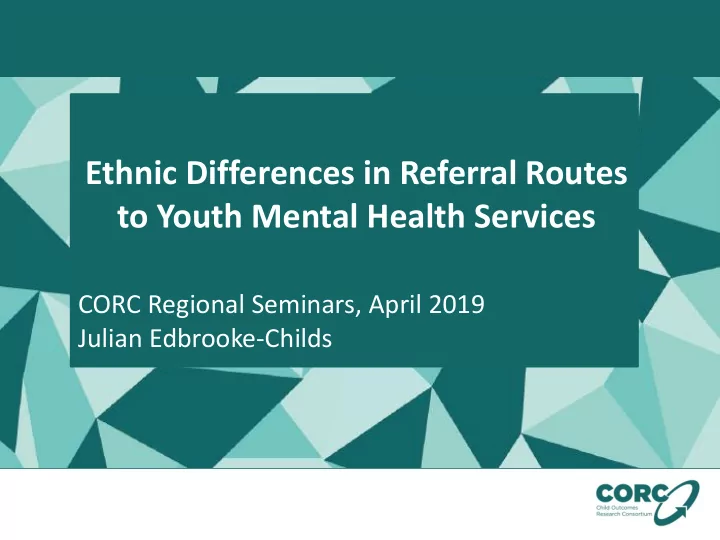

Ethnic Differences in Referral Routes to Youth Mental Health Services CORC Regional Seminars, April 2019 Julian Edbrooke-Childs
Acknowledgements • The Policy Research Unit in the Health of Children, Young People, and Families is funded by the Department of Health Policy Research Programme. This is an independent report commissioned and funded by the Department of Health. The views expressed are not necessarily those of the Department of Health. • The research was supported by the National Institute for Health Research (NIHR) Collaboration for Leadership in Applied Health Research and Care (CLAHRC) North Thames at Bart’s Health National Health Service (NHS) Trust. The views expressed are those of the authors and not necessarily those of the NHS, the NIHR, or the Department of Health.
Acknowledgements • Dr Praveetha Patalay (co-author) • The authors would like to thank Miranda Wolpert and Jessica Deighton for helpful comments on an earlier draft. • The authors would like to thank members of Child Policy Research Unit (CPRU) and the CORC team. • Thanks to all of the services, professionals, young people and families who contributed data.
Why this is important https://files.digital.nhs.uk/9B/518A64/MHCYP%20 2017%20Trends%20Characteristics.pdf
Importance of examining referral routes • Early intervention is an important indicator of prognosis • One in five young people with a diagnosable mental health problem accesses mental health services in the United Kingdom • Range of factors need to be considered when examining referral routes
Factors associated with referral route • Data are nested within services • Socio-economic deprivation: areas of higher deprivation may have higher levels of minority ethnic groups and more young people with mental health problems • Young person’s age, sex, problem type, and contextual factors, which are known to covary and to be associated with different referral routes
Ethnic differences
Previous studies on ethnic differences in referral routes • Young people from minority ethnic backgrounds may be less likely to be referred through primary care agencies than are white young people • Association with socio-economic disadvantage may result in different referral routes • Number of ethnic minority young people in custody has increased by 16% over the past decade
Aims of the present study • Examine ethnic differences in referral route • Accounting for relevant factors including service-variation, age, sex, problem type, and contextual factor • Additional sensitivity analyses controlling for service-area deprivation
Method
Method
Results
Results
Results
Limitations • Routinely collected data from one country • Need for detailed ethnic breakdowns and family-level indicators of socio-economic disadvantage • Cannot explain reasons for these differences • Controlled for a number of relevant factors
Conclusions • Young people from minority ethnic backgrounds may be more likely to access youth mental health services through different referral routes, such as social care/youth justice, than are white majority young people. • National and local policy and practice guidelines should prioritize engagement between youth mental health services and local referring organizations to ensure early identification and appropriate intervention for young people from minority ethnic backgrounds.
Questions • How do the findings fit with your experiences? • How does your service work to identify specific needs of your local community? • How can we help services to be representative and responsive to the local community? • Are there ethnic differences in the prevalence of different types of mental health problems? • Are measures appropriately tailored to identify needs of young people from different groups?
Ethnic Differences in Referral Routes to Youth Mental Health Services CORC Regional Seminars, April 2019 Julian Edbrooke-Childs
Recommend
More recommend